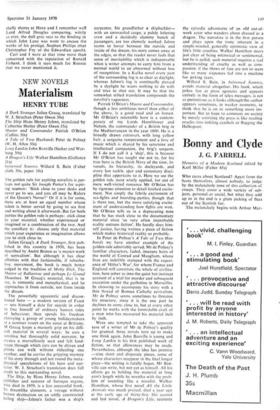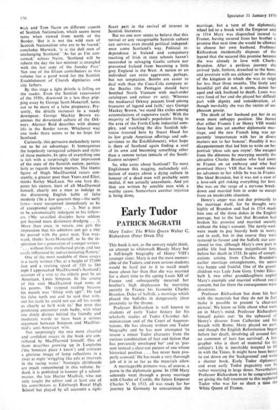Bonny and Clyde
J. G. FARRELL
Memoirs of a Modern Scotland edited by Karl Miller (Faber 45s) Who cares about Scotland? Apart from the Scots themselves, almost nobody, to judge by the melancholy tone of this collection of essays. They cover a wide variety of sub- jects, personal or social, but what they add up to in the end is a glum picking of fleas out of the Scottish fur.
The melancholy begins with Arthur Mar-, wick and Tom Nairn on different aspects of Scottish Nationalism, which seems more tame when viewed from north of the Border. 'But it is not the wild men of Scottish Nationalism who are to be feared,' concluks Marwick, 'it is the dull men of unchanging Scotland.' As far as I'm con- cerned,' echoes Nairn, 'Scotland will be reborn the day the last minister is strangled with the last copy of the Sunday Post.' Not one of the fifteen contributors to this volume has a good word for the Scottish Establishment of Church dignitaries and city fathers.
By this stage a light drizzle is falling on the reader. Even the Scottish renaissance of the 1930s, discussed in a less than grip- ping essay by George Scott-Moncrieff, turns out to be more of a false pregnancy. Pre- sently, the drizzle increases to a steady downpour. George Mackay Brown ex- amines the devastated culture of the Ork- neys. Alastair Reid describes with dismay life in the Border towns. Whichever way one looks there seems to be no hope for Scotland.
Curiously, this pervasive melancholy turns out to be an advantage. It homogenises the hopelessly variegated subjects and styles of these memoirs. In spite of everything one is left with a surprisingly clear impression of the state of the Scottish nation, particun larly as regards literary matters. The titanic figure of Hugh MacDiarmid recurs cone stantly, a greater poet than Yeats and Eliot, thinks Sorley MacLean. No one here dis- putes his stature, least of all MacDiarmid himself, clearly not a man to indulge in the distressing English habit of false modesty (In a few quarters they—the early lyrics—were recognised immediately to be of exceptional quality . . .). Nor a man to be automatically indulgent to his follow- ers (`My so-called disciples have seldom got beyond mere dictionary-dredging . . .'). More than once, in return, one gets the impression that his admirers can get a tiny bit peeved with the great man. Too way- ward, thinks Scott-Moncrieff, to be the in- spiration for a generation of younger writers ... without firm intellectual grasp, and too easily influenced by indiscriminating flattery.' One of the most readable of these essays is a racily written ('So, at a height of 37,000 feet and a cruising speed of 520 to 580 mph I approached MacDiarmid's Scotland') account of a visit to the elderly poet by an American, Louis Simpson. In the course of this visit MacDiarmid read some of his poems. 'He stopped reading because his mouth was "filling with spit". He had his false teeth out and he said that with- out his teeth he could not cut off his words as clearly as he'd wish to.' But even this promising encounter ends badly, with what one dimly divines behind the friendly and moderate words to have been a serious argument between Simpson and MacDiar- mid's anti-American wife.
Not surprisingly the two most cheerful and confident essays in the book are con- tributed by MacDiarmid himself. One of them describes growing up in Langholm (`the bonniest place I know') and contains a glorious image of lamp reflections in a river at night 'wriggling like eels at intervals in the racing water.' Nostalgic childhoods are much remembered in this volume. In- -
deed, it is published in honour pf a school- master, the late Hector MacIver, who not
only taught the editor and at least one of his contributors at Edinburgh Royal High School but played by all accounts a signis ficant part in the revival of interest in Scottish literature.
But no one now seems to believe that this revival or any recognisable Scottish culture can survive, even should political independ- ence come Scotland's way. Political in- dependence in Ireland and compulsory teaching of Irish in state schools haven't succeeded in salvaging Gaelic culture nor prevented Ireland from becoming a little
grey England in the West. A nation or an individual can resist aggression, perhaps, but not temptation. Bombs are easier to deal with than the Coca-Cola company or the Beatles (the Pentagon should have bombed North Vietnam with mail-order catalogues and colour TV sets). 'Whereas the mediaeval Orkney peasant lived among treasures of legend and faith,' says George Mackay Brown, 'we stand like exiles among accumulations of expensive trash.' With the majority of Scotland's population living in the area of the Forth-Clyde industrial com- plex, and watching the dire Scottish tele- vision (roasted here by Stuart Hood for its low grade American offerings and sub- servience to the Establishment), what hope is there of Scotland again finding a soul of its own and becoming something other than a remote tartan tentacle of the South- Eastern octopus?
So, who cares about Scotland? To most Englishmen this nagging, melancholy col- lection of essays about a dying culture in honour of a dead man will probably seem restful, if not actually anaesthetic. And yet they are written by sensible men with a worthy cause. Somewhere another injustice is being done,



































 Previous page
Previous page